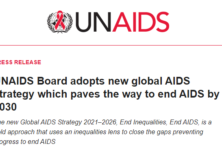A ground-breaking review provides stark evidence of the damage criminalisation has on preventing and treating HIV among people who inject drugs.

The systematic evidence review – the first of its kind to be published – brings into sharp focus how criminalisation of drug use negatively affects HIV prevention and treatment outcomes for individuals, programmes and the population as a whole.
The review provides compelling evidence for the reform of legal and policy frameworks that criminalise drug use, and was published in the Lancet in May.
A total of 106 peer-reviewed studies published between 2006 and 2014 were included in the analysis. They were mainly conducted in North America and Asia, although research from Eastern Europe, South America, the Middle East, Europe and Oceania was also included.
The vast majority of studies – 85 in total (80%) – found criminalisation to negatively affect HIV prevention and treatment outcomes for people who inject drugs. Of the remainder, 10 (9%) suggested no association, five (5%) suggested a beneficial effect, one (1%) suggested both beneficial and negative effects, and five (5%) suggested both null and negative effects.
The analysis focused on key indicators of criminalisation, including incarceration, street-level policing, drug paraphernalia laws and practices, prohibitions or restrictions on evidence-informed HIV prevention interventions, and national drug strategies.
These interventions were found to negatively impact levels of injecting drug use, high-risk practices such as syringe sharing, access to sterile injecting equipment through needle exchange programmes, and HIV prevalence among people who inject drugs.
Even among the studies that reported no direct link between criminalisation and HIV, half found that punitive drug laws did not result in reductions in the frequency of drug use, a cessation in injecting or declines in injecting drug use, even though this was the intent of these laws in the first place.
Other studies revealed no increases in drug injecting when access to key harm reduction programmes – a needle and syringe exchange and a supervised injecting facility – were expanded. This is a common concern of opponents of these types of interventions, but these studies found that focusing on evidence-informed HIV prevention and treatment measures was unlikely to increase rates of drug use.
The review adds to mounting evidence, collected over more than two decades, which suggests that laws and policies prohibiting illegal drug use could be playing a central role in damaging the health of people who inject drugs.
The authors conclude: “Decisive efforts to move away from punitive policies, including criminalisation, to manage injection drug use will be pivotal to achieving the UNAIDS targets… Our findings indicate that international efforts are urgently needed to reform existing legal and policy frameworks that attempt to limit the harms of drug use, to effectively support HIV prevention and treatment efforts globally and to help end the HIV epidemic.”


 ПОИСК ПО САЙТУ
ПОИСК ПО САЙТУ  поиск по ресурсному центру
поиск по ресурсному центру 



